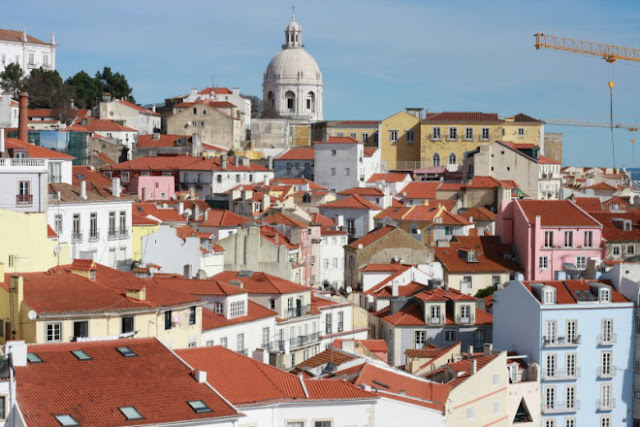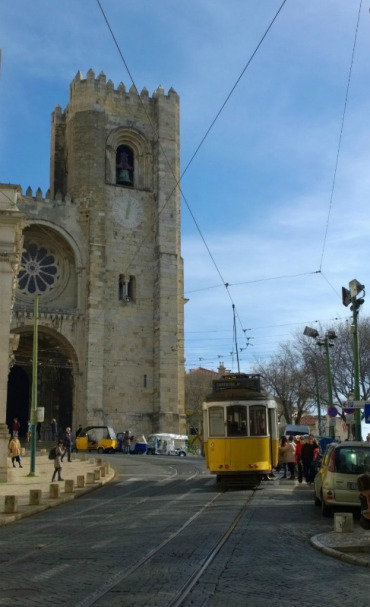Alfama is one of the oldest neighborhoods in Europe and surely one of the most picturesque of Lisbon. This medieval neighborhood escaped the earthquake of 1755 and keeps its Moorish and Jewish roots in many of its traits and characteristics.
The beautiful views of the city and the Tagus seduce both the travelers and the Lisbon people and a walk through its alleys, squares and viewpoints is absolutely mandatory wen visiting Lisbon.
On foot, if you are willing to climb the stone paved streets, or on board of the tram 28 (or on a tuk-tuk, the new fashion in Lisbon), you will discover at every turn of its winding streets an image worthy of a photograph.
Essential is a visit to Lisbon Cathedral (Church of St. Mary Major) whose construction began in the second half of the twelfth century, after the taking of the city from the Moors by D. Afonso Henriques (first king of Portugal). The various renovations and reconstructions after the Great Earthquake made today’s Cathedral a mixture of styles, having Romanesque, Gothic and Baroque elements.
Following the route of the tram tracks and passing the Largo do Limoeiro, you will find the Mirador de Santa Luzia, near the church of the same name. The view of the river and Alfama is stunning, allowing sight of the dome of the National Pantheon (Church of Santa Engrácia), the Church of Santo Estevão and the two white towers of the Church of São Miguel.
Continuing the tour we arrive at Largo das Portas do Sol from which extends a wide terrace (Belvedere das Portas do Sol) from where it reaches a magnificent view of the eastern side of Lisbon. On top of the hill on the left of the Pantheon dome, we see the Monastery of São Vicente de Fora. On its slopes, Alfama, on pastel colors descends, through the narrow winding streets, to the Tagus River.
In the lower part of the neighborhood you will find the Fado Museum and Casa dos Bicos. This 16th-century building, with its characteristic walls covered with diamond shape stones houses, currently, the José Saramago Foundation and the Archeological Site of the Lisbon Museum.
All being said, keep your map in your bag, your camera on your hands, and wander around. If in Summer, lunch in one of the many terraces and ask for grilled sardines. A good Portuguese wine wont’ be a bad idea and in the end you can indulge with a sweet desert and, of course, a smoking hot expresso (Portuguese call it Bica). Just like a local!
You can also check and bookmark my tip and location of Alfama neighborhood on TravelGap.
The beautiful views of the city and the Tagus seduce both the travelers and the Lisbon people and a walk through its alleys, squares and viewpoints is absolutely mandatory wen visiting Lisbon.
On foot, if you are willing to climb the stone paved streets, or on board of the tram 28 (or on a tuk-tuk, the new fashion in Lisbon), you will discover at every turn of its winding streets an image worthy of a photograph.
Essential is a visit to Lisbon Cathedral (Church of St. Mary Major) whose construction began in the second half of the twelfth century, after the taking of the city from the Moors by D. Afonso Henriques (first king of Portugal). The various renovations and reconstructions after the Great Earthquake made today’s Cathedral a mixture of styles, having Romanesque, Gothic and Baroque elements.
Following the route of the tram tracks and passing the Largo do Limoeiro, you will find the Mirador de Santa Luzia, near the church of the same name. The view of the river and Alfama is stunning, allowing sight of the dome of the National Pantheon (Church of Santa Engrácia), the Church of Santo Estevão and the two white towers of the Church of São Miguel.
Continuing the tour we arrive at Largo das Portas do Sol from which extends a wide terrace (Belvedere das Portas do Sol) from where it reaches a magnificent view of the eastern side of Lisbon. On top of the hill on the left of the Pantheon dome, we see the Monastery of São Vicente de Fora. On its slopes, Alfama, on pastel colors descends, through the narrow winding streets, to the Tagus River.
In the lower part of the neighborhood you will find the Fado Museum and Casa dos Bicos. This 16th-century building, with its characteristic walls covered with diamond shape stones houses, currently, the José Saramago Foundation and the Archeological Site of the Lisbon Museum.
All being said, keep your map in your bag, your camera on your hands, and wander around. If in Summer, lunch in one of the many terraces and ask for grilled sardines. A good Portuguese wine wont’ be a bad idea and in the end you can indulge with a sweet desert and, of course, a smoking hot expresso (Portuguese call it Bica). Just like a local!
You can also check and bookmark my tip and location of Alfama neighborhood on TravelGap.










Portugal has always been on my must-see list for travel. Thanks for sharing your experience there!
ReplyDeleteHi Veena, hope you can visit Portugal soon. It has so many interesting places and experiences waiting for you :)
DeleteLooks like something to add to my Europe specific bucket list. JanD
ReplyDeleteHi Jan! Please do add it to your list and visit it. I'm sure you will love it!
DeleteLisbon has been on my top list forever :)
ReplyDeleteMaybe 2017 is the year :)
DeleteKeeping a map in hand is really a very useful tip that you gave here. Lisbon is one of the top places in my list. I will keep your post in mind when I happen to visit
ReplyDeleteHi Neha! Hope that you can visit Portugal soon. If you need some tips just say :)
DeleteBeautiful photos! I can't wait to visit Portugal and see these amazing sights. Thanks for the tips :)
ReplyDeleteHi Leslie, thank you for your kind words. Hope you can visit Portugal soon.
Delete